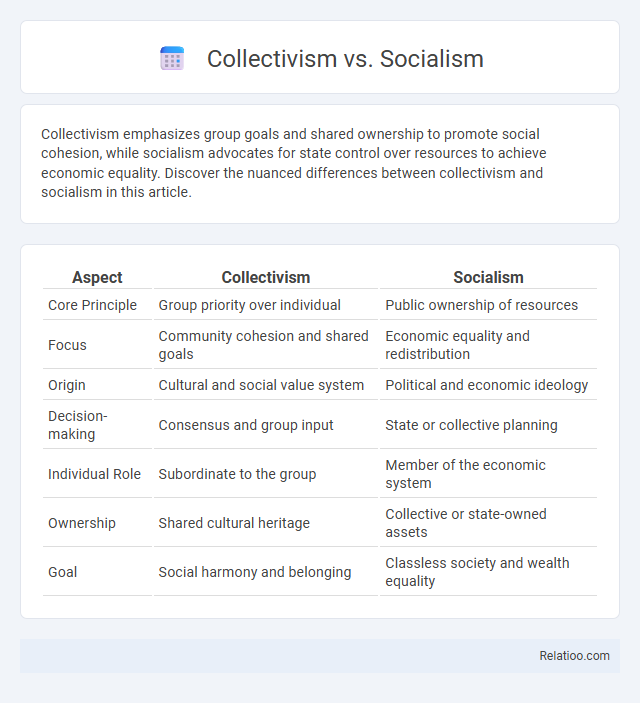Collectivism emphasizes group goals and shared ownership to promote social cohesion, while socialism advocates for state control over resources to achieve economic equality. Discover the nuanced differences between collectivism and socialism in this article.
Table of Comparison
| Aspect | Collectivism | Socialism |
|---|---|---|
| Core Principle | Group priority over individual | Public ownership of resources |
| Focus | Community cohesion and shared goals | Economic equality and redistribution |
| Origin | Cultural and social value system | Political and economic ideology |
| Decision-making | Consensus and group input | State or collective planning |
| Individual Role | Subordinate to the group | Member of the economic system |
| Ownership | Shared cultural heritage | Collective or state-owned assets |
| Goal | Social harmony and belonging | Classless society and wealth equality |
Understanding Collectivism: Core Principles
Understanding collectivism involves recognizing its core principles centered on prioritizing group goals and collective ownership over individual interests. You benefit from a system emphasizing shared responsibilities, mutual support, and cooperation to achieve common objectives. This contrasts with socialism's structured economic approach and other variants of collectivism by focusing more broadly on social unity and collective well-being.
Defining Socialism: Key Concepts
Socialism is an economic and political system advocating for collective or governmental ownership and administration of the means of production and distribution of goods, aiming to reduce inequality and promote social welfare. Unlike general collectivism, which emphasizes group goals and shared responsibility broadly, socialism specifically focuses on wealth redistribution and state intervention to achieve economic fairness. Understanding socialism's key concepts helps you differentiate it from other ideologies that may prioritize group cooperation without mandating state control or equal resource allocation.
Historical Origins of Collectivism and Socialism
The historical origins of collectivism trace back to early communal societies and indigenous cultures that emphasized group ownership and shared resources, while socialism emerged in the 19th century as a response to industrial capitalism, advocating for public ownership and wealth redistribution. Collectivism broadly encompasses any system prioritizing the group over the individual, whereas socialism specifically promotes political and economic structures for collective control of production. Understanding these distinctions helps you grasp how historical contexts shaped the development and application of these interconnected ideologies.
Differences Between Collectivism and Socialism
Collectivism emphasizes the collective group's interests, prioritizing shared goals and cooperation over individual desires, while socialism specifically advocates for social ownership of the means of production and wealth redistribution to achieve economic equality. Unlike collectivism, socialism incorporates political and economic systems aimed at reducing class disparities through state intervention or cooperative management. Therefore, collectivism is a broader ideological principle focused on group unity, whereas socialism is a defined socioeconomic system with distinct policies and structures.
Collectivism in Practice: Global Examples
Collectivism in practice manifests through diverse global examples such as the communal farms of Cuba, cooperative enterprises in Mondragon, Spain, and kibbutzim in Israel, emphasizing shared ownership and collective decision-making. These models prioritize the redistribution of resources and collaborative labor to achieve social equity, differing from socialism's state-driven approach and communism's classless society ideals. Your understanding of collectivism expands by examining how these systems balance individual contributions with communal benefits in varied economic and cultural contexts.
Socialism in Action: Case Studies
Socialism in action is exemplified by case studies such as the Nordic model in Sweden, which combines extensive social welfare programs with a market economy to reduce inequality and promote social justice. Contrasted with collectivism, which emphasizes communal ownership and decision-making often at a local or organizational level, socialism implements state-managed or cooperative control over major industries and resources. These practical applications demonstrate socialism's focus on redistributive policies and public services aimed at creating more equitable societies, differing fundamentally from collectivist approaches that prioritize communal consensus and shared cultural values.
Impact on Economics: Collectivist vs Socialist Models
Collectivism emphasizes communal ownership and shared responsibilities, fostering economic cooperation and reducing inequalities through collective decision-making. Socialist models incorporate state control or regulation of key industries, aiming to redistribute wealth and provide social welfare, which can enhance economic stability but may limit individual entrepreneurial incentives. The impact on economics varies as collectivism promotes grassroots participation and local resource management, while socialism relies on centralized planning to achieve social equity and economic efficiency.
Political Structures: Governance in Each System
Governance in collectivism emphasizes shared ownership and decision-making typically within communities or cooperatives, aiming for equal participation and resource distribution. Socialism structures government control over key industries and resources to ensure equitable access, often implemented through centralized or democratic institutions regulating economic activities. Your understanding of collectivism, socialism, and communism reveals distinct political frameworks where collectivism promotes decentralized communal governance, socialism enforces state or worker control, and communism seeks a stateless, classless society through collective ownership.
Critiques and Controversies: Challenges Faced
Critiques of collectivism often highlight the suppression of individual freedoms and potential inefficiencies in resource allocation due to centralized control. Socialism faces controversies regarding economic stagnation and the risk of bureaucratic expansion that may hinder innovation and personal incentives. Challenges within collectivism include balancing collective goals with individual rights, often leading to debates on optimal governance structures and the potential for authoritarianism.
The Future of Collectivism and Socialism in Society
The future of collectivism and socialism in society hinges on their ability to adapt to evolving economic and social challenges, emphasizing shared ownership and equitable resource distribution. Your role in fostering community-driven initiatives can help bridge the gap between individual needs and collective well-being, promoting sustainable social models. Emerging trends suggest a hybrid approach blending collectivist values with pragmatic socialism will shape inclusive policies and resilient economies.

Infographic: Collectivism vs Socialism
 relatioo.com
relatioo.com